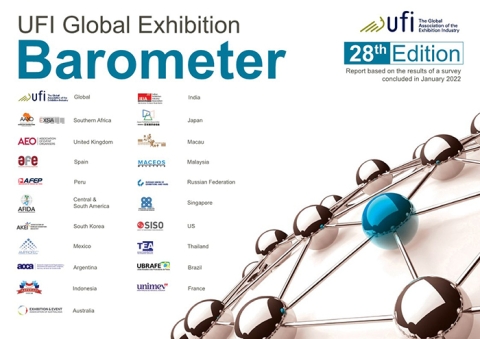UFI Report: Exhibition Industry Is on Track to Bounce Back in 2022

The recovery of the exhibition industry is accelerating, with global show revenues expected to reach 71% of 2019 levels this year, according to the 28th edition of the Global Barometer report, released on Feb. 24 by UFI, the Global Association of the Exhibition Industry.
Designed to assess the impact of global economic conditions on the exhibition industry, UFI’s latest research report provides updates on the impact of COVID-19 and perspectives for the industry in the year ahead.
Conducted in collaboration with 21 UFI member associations and concluded in January 2022, the biannual Global Barometer survey provides insights from 401 companies across 53 countries and regions. The results highlight the quickening pace of the industry’s recovery in 2022, primarily driven by in-person exhibitions and business events following the continuing impact of the pandemic throughout 2021, according to UFI officials.
“The sun is finally rising at the end of a long, dark pandemic,” said Kai Hattendorf, UFI managing director and CEO. “The perspectives for 2022 are brighter and continue to improve quickly. As the industry bounces back, the key issues now facing companies are around internal management issues and the impact of digitization. As the value of physical events is constantly reinforced, we are well on track to achieve pre-pandemic levels of activity.”
The study also includes outlooks and analysis for 24 focus countries and regions, including Argentina, Australia, Brazil, Chile, China, Colombia, France, Germany, Hong Kong, India, Italy, Japan, Malaysia, Mexico, Russia, Singapore, South Africa, South Korea, Spain, Thailand, Turkey, the UAE, the U.K. and the U.S., as well as five aggregated regional zones.
Key highlights include:
- Globally, the industry expects two-thirds of markets to operate at normal levels in the second quarter and one-quarter of the global market to operate at reduced activity levels.
- The proportion of companies declaring normal operational activity has increased from less than 2 in 10 in July 2021 to around 4 in 10 between October 2021 and February 2022. This looks set to increase to around 6 in 10 companies expecting normal activity levels starting in March 2022.
- The proportion of companies expecting “no activity” dropped from 34% to 16% during the second half of 2021, and only 4-5% of companies expect no activity moving forward from March 2022. The results vary depending on location and are primarily driven by confirmed or expected reopening dates for exhibitions.
- When asked what elements would most enable exhibitions to bounce back, 7 in 10 companies selected “Lifting of current travel restrictions,” while 5 in 10 selected “Readiness of exhibiting companies and visitors to participate again,” “Mid-term visibility in terms of public policies, including travel restrictions,” and “Lifting of current public policies that apply locally to exhibitions.”
- Overall, 53% of companies received no public financial support [during the pandemic], and for the majority of those that did, financial public aid represented less than 10% of their overall costs.
- In line with the previous edition of the Global Barometer, released in July 2021, “Impact of the COVID-19 pandemic on the business” remains the most pressing business issue, although this has dropped to 19% of respondents, from 29% six months ago.
- There has also been a shift in the second and third most pressing issues, with “Internal management challenges” (19% of respondents, compared to 9% six months ago) and “Impact of digitalization” (16%, compared to 10% six months ago) forming the top three.
- “Competition with other media” is now the fourth most pressing issue (14%, compared to 5% six months ago), while “State of the economy in home market” drops to the fifth spot (12%), from being the second most pressing issue just six months ago (19% of respondents).
- The three components of “Internal management challenges” are all almost equally represented within the responses: “Human resources” (56% of respondents), “Business model adjustments” (54%) and “Finance” (48%).
- In terms of future exhibition formats, 80% of respondents (up from 78% six months ago and 64% 12 months ago) agree that “COVID-19 confirms the value of face-to-face events” and anticipate the sector to bounce back quickly (with 38% stating, “Yes, for sure” and 42% stating, “Most probably”). Thirteen percent of respondents are unsure.
The Barometer also surveyed the perception and engagement of the industry on the recently launched Net Zero Carbon Events initiative, with global results indicating that:
- 66% of respondents are confident that “This initiative is of key relevance to secure the future of the industry,” just weeks after it was launched.
- 91% of companies agree that “It is important that the event industry works together to reduce the environmental impact of the components it controls (production of the event).”
- 89% of companies believe that “It is important that the event industry works with its clients (participants) and other stakeholders (destinations, transport and accommodation) to reduce the environmental impact of the other components attributed to events.”
- 1 in 4 companies say they are already on track to achieve Net Zero Greenhouse Gas emissions before 2050.
The next UFI Global Barometer survey will be conducted in June 2022. Download the full report here.
Don’t miss any event-related news: Sign up for our weekly e-newsletter HERE and engage with us on Twitter, Facebook, LinkedIn and Instagram!


Add new comment